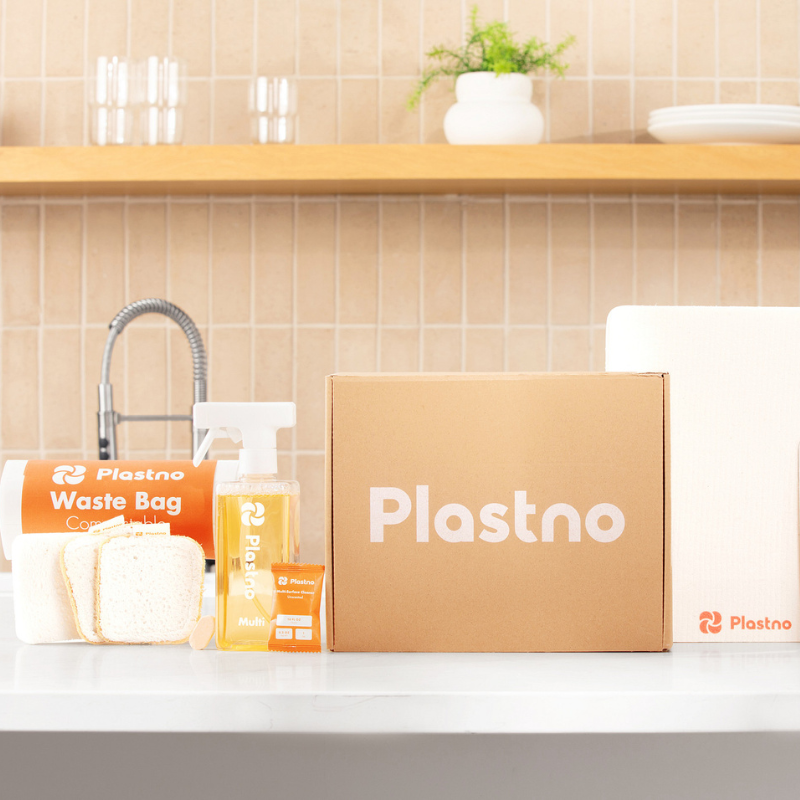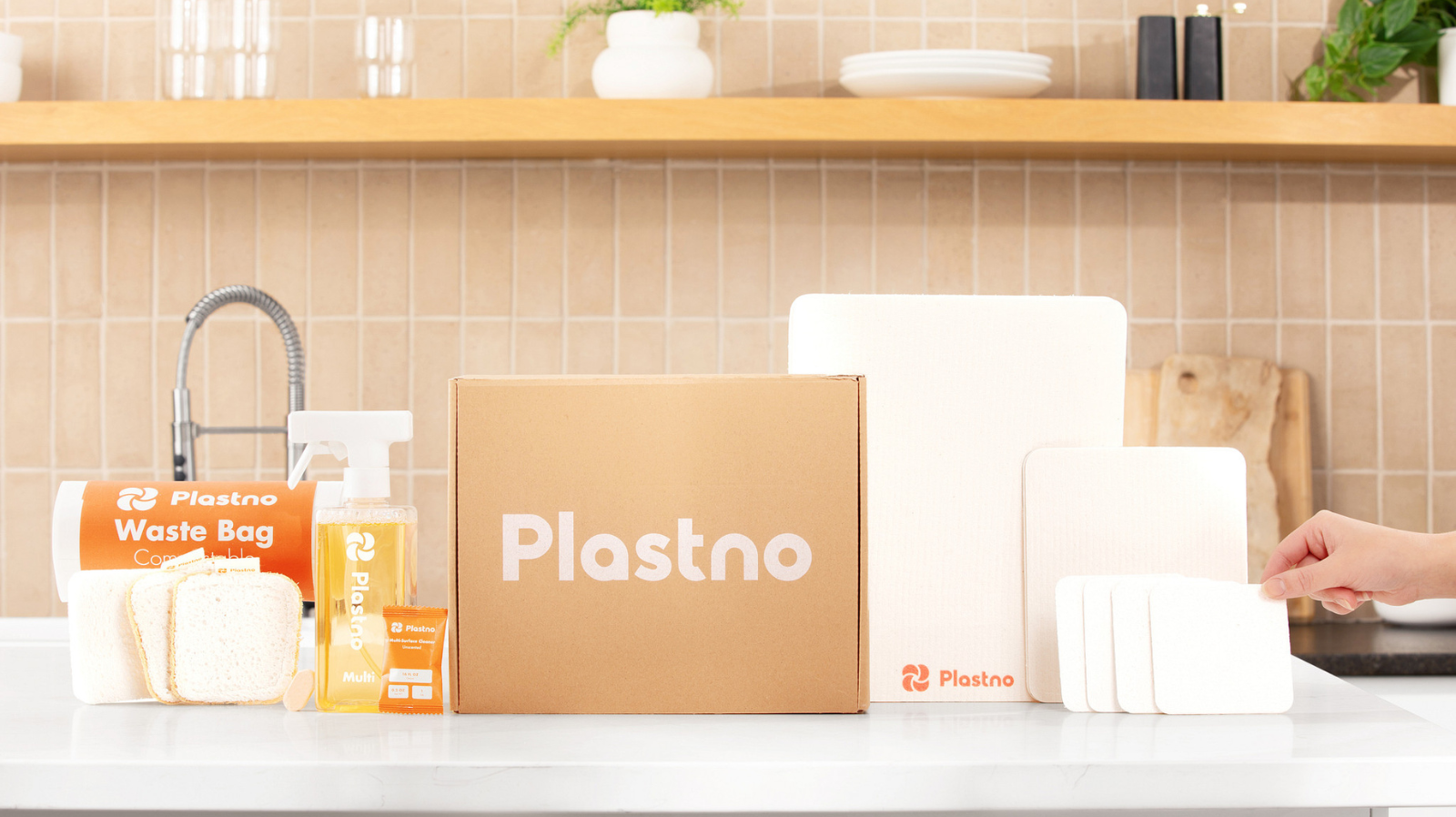Our Top Picks
Green Hive is reader-supported. When you purchase through links on our site, we may earn an affiliate commission. To understand our thorough approach to rating brands and products, explore our comprehensive methodology.
Our Top Picks
Green Hive is reader-supported. When you purchase through links on our site, we may earn an affiliate commission. To understand our thorough approach to rating brands and products, explore our comprehensive methodology.
Key takeaways
- Plastno compostable bags are as durable as traditional plastic trash bags.
- Crafted from renewable, plant-based materials like corn starch and sugar cane to ensure a minimal environmental footprint.
- Their robust, multilayer design prevents unfortunate spills, making them a practical choice for eco-friendly waste management.
Introduction
In today's world, plastic bags are a staple of convenience. Yet, their environmental impact is anything but light. Often used as trash bags, these plastics end up in landfills, accumulating alongside myriad other types of waste. Here, plastic bags can take decades to break down. Alternatively, many of them end up caught in trees or blowing in the wind, showing us just how much plastic we use.
The good news is that biodegradable bags offer a hopeful change. Biodegradable bags promise a step towards a cleaner, greener future by decomposing much faster than traditional plastics. However, selecting the right biodegradable bag is crucial, as not all are as eco-friendly as they claim.
In our quest for sustainable solutions, we've stumbled upon Plastno, a brand offering compostable trash bags and other eco-friendly cleaning products. Our upcoming review will closely examine Plastno's environmental claims and assess the quality of their compostable bags in detail.
Join us as we explore whether Plastno lives up to its green promises!
Plastno Overview: Quality and Sustainability
This sustainable brand emerged from a simple yet powerful realization: our daily convenience doesn't have to come at the earth's expense. Julian Silva, the Founder of Plastno, shares that his journey began during a walk with his dog on trash pick-up day. Shocked by the realization that his discarded plastic was harming the oceans, Julian embarked on a search for greener options.

“Household cleaning products are essential in any home but it was impossible to find any that didn’t come packaged in plastic, was affordable or wasn't greenwashed. I wanted to do my part to help, and from there, Plastno was born.” Julian told us.
Plastno distinguishes itself with bags that boast exceptional strength and durability, rivaling traditional plastic options without harming the planet. Designed for those eager to make a positive impact on the environment without sacrificing convenience, Plastno makes it easy for consumers to contribute to a more sustainable future, one bag at a time.
Plasno's mission is clear: to revolutionize cleaning by offering non-toxic, eco-friendly essentials. Their compostable waste bags are designed to be safe, convenient, affordable, and effective, ensuring a clean home while contributing to a healthier planet.
Are Plastno Bags Really Compostable and Biodegradable?
Plastno takes pride in creating products that are fully compostable and biodegradable. Crafted from renewable, non-GMO, plant-based materials, these bags naturally decompose in composting settings or landfills, steering clear of environmental harm. Once there, they will transform into organic matter or biomass that enriches the earth instead of polluting it.
But don't just take their word for it. Plastno's commitment to sustainability is backed by rigorous third-party certifications. Their compostable bags are BPI-certified and TUV-certified, ensuring they meet strict standards for compostability both at home and in industrial environments. This means Plastno bags can be composted easily, turning into safe organic matter for plants.
Additionally, their 12-month shelf life serves as further evidence of their ability to break down!
Our Honest Review on Plastno Compostable Garbage Bags
We've thoroughly examined Plastno trash bags, covering their quality, the materials used in their construction, the certifications they hold, and their overall sustainability. With this honest review, we aim to give you a comprehensive understanding of Plastno bags, helping you make informed choices about your waste disposal options:

Quality
Plastno trash bags are as strong as traditional plastic bags, making the switch to plant-based options seamless and worry-free. These bags stand up to the test of heavy waste without ripping or leaking – a common issue with other biodegradable bags.
Their multilayer design is engineered to handle heavy loads – even when stretched to their 13-gallon limit – preventing any unfortunate spills. The bags feature an easy-tie closure for convenient use and transportation, and their design includes a flat-sealed bottom to prevent leaks, rips, and tears.
Thanks to their classic white design, these bags also look and feel just like traditional trash bags. The only difference is their 12-month shelf life. Keep in mind that they're designed to break down, not stick around. So, make sure to buy only a few months' supply to avoid waste.
Plant-based Renewable Materials
Plastno's compostable trash bags are made from plant-based materials, specifically corn starch and sugar cane. These 100% renewable resources grow on responsibly-managed plantations, ensuring an eco-friendly footprint from the ground up.

The addition of materials like Polybutylene Adipate Terephthalate (PBAT) and Polylactic Acid (PLA) boosts the bags' strength and compostability. PLA, extracted from sugar cane, mirrors the convenience of plastic without its lasting environmental impact. It breaks down completely, leaving no toxic residue behind. Similarly, PBAT vanishes when composted, transforming into harmless components without leaving toxic waste.
Third-party Certifications
Plastno bags come with the assurance of BPI and TUV certifications, two highly respected markers of compostability in the eco-friendly product space. These certifications serve as a solid guarantee that Plastno bags are truly compostable, ensuring that their eco-friendly claims are backed by rigorous testing and not just marketing rhetoric.

"We believe that certifications are the most effective way to validate a product's claims. When a product holds trustworthy certifications, consumers can feel secure knowing that they are purchasing a truly sustainable product." Julian's perspective deeply resonates with us, underscoring the importance of reliable standards in fostering consumer trust and confidence.
The BPI certification means that Plastno bags meet rigorous standards for industrial composting. The BPI certifications is widely considered to be the gold standard for compostable items in the US and it ensures that once in a commercial facility, Plastno bags decompose quickly, completely, and safely, leaving behind no harmful residues.
On the other hand, the TUV certification adds an extra layer of confidence, especially for those interested in home composting. It verifies that Plastno bags can break down effectively in the variable conditions of a home garden, transforming into safe, organic matter for your plants. This certification is particularly noteworthy because home composting presents unique challenges compared to commercial facilities.
Sustainability
Suited for everything from backyard compost piles to large-scale composting facilities or regular trash disposal, Plastno bags break down quickly and safely, ensuring a residue-free decomposition process. These bags are fully digested by natural bacteria in less than a year, making them an ideal alternative to traditional plastic bags.

Plastno is also dedicated to reducing single-use waste through their packaging choices. With 100% recyclable and compostable materials, complemented by FSC certification, Plastno guarantees that even their packaging has a minimal environmental footprint.
Why You Should Use Compostable Trash Bags
When it comes to throwing away our trash, we're faced with a big choice. On one hand, we've got the ever-present plastic trash bags. Super convenient, yes, but they come with a heavy cost to our planet. Plastic bags stick around for hundreds of years, slowly breaking down into tiny, harmful pieces of plastic that find their way into our oceans and soil.
On the flip side, we have compostable trash bags, which can be a total game-changer in how we think about waste. Unlike their plastic counterparts, they decompose in just a few months, leaving behind absolutely nothing harmful. They're crafted from natural materials like corn starch, a stark contrast to the petroleum-based plastics we're used to.
Replacing plastic bags with compostable options can reduce our reliance on fossil fuels and cut down on the plastic that ends up in our natural spaces.
Plastno Trash Bags vs Other Biodegradable Bags
Biodegradable bags might sound eco-friendly, but they're not always what they seem. BPI executive director says the term biodegradable is “too vague to be meaningful”, as it doesn't guarantee quick or non-toxic breakdown. Usually made from synthetic materials, these bags break down into smaller plastic pieces, a process that can take centuries and leave a hefty environmental mark. In contrast, compostable bags decompose quickly and fully into non-toxic elements, truly minimizing environmental damage.

Here are the key differences between Plastno Bags and regular biodegradable bags:
Plastno Bags
- Made from sustainably farmed plants.
- Hold BPI and TUV certifications, verifying their compostability.
- Break down into non-toxic elements.
- Meet strict requirements to break down within months.
- Resistant to ripping or leaking, even with moisture.
- Decompose both at home and in commercial composting facilities.
- Retain a classic white color, blending seamlessly with traditional trash bag aesthetics.
Other Biodegradable Bags
- Made from synthetic materials.
- Claim to be "biodegradable" without proving it's really better for the environment.
- Eventually break down into small pieces of plastic.
- May require centuries to decompose completely.
- Prone to splitting or tearing, especially when wet.
- Lack guaranteed compostability, often misleading consumers.
- Prioritize aesthetic design over genuine environmental sustainability.
Why We Recommend Plastno Compostable Garbage Bags
Plastno bags stand out for their strength, durability, and genuine compostability, offering a truly sustainable alternative to those seeking responsible waste management solutions.
FAQs
How long do Plastno bags take to decompose?
Plastno bags take approximately 3 months to decompose in a commercial composting facility and around 6 months in home composting systems. In landfills, the decomposition process is slower, ranging between 24 to 36 months. Despite this, this timeframe is significantly shorter compared to the centuries it takes for traditional plastic bags to decompose.
Can Plastno eco-friendly bags hold up in your home?
Yes, Plastno compostable trash bags can handle heavy waste without tearing or leaking, even when wet. They break down easily at home or in commercial facilities, ensuring strength without environmental harm. Plus, their classic white color matches regular trash bags perfectly.
Can I use Plastno bags for garbage and trash?
Yes! Plastno bags are suitable for garbage and trash disposal. They offer durability and resistance to ripping or leaking, ensuring your waste is securely contained. Additionally, their compostable nature makes them an environmentally friendly option for waste management.
Do I need to compost Plastno products?
No, composting Plastno products is not necessary. Whether you compost at home or simply aim to minimize single-use plastic, Plastno bags offer an eco-friendly solution for trash disposal. They're designed to break down safely in composting facilities, but can also be used for regular trash disposal without the need for composting.
Final Thoughts
When it comes to eco-friendly waste disposal solutions, Plastno compostable bags emerge as the clear winner. Their strength rivals that of traditional plastic bags, yet they decompose quickly and fully, leaving no harmful residues behind. Unlike regular biodegradable bags, which often fall short on their promises, Plastno bags are certified compostable and offer a reliable, environmentally conscious option.

With certifications from reputable organizations like BPI and TUV, Plastno offers assurance that their claims of compostability are backed by rigorous testing and standards. This, coupled with their impressive strength, quality construction, and commitment to sustainability, makes Plastno bags a compelling alternative to traditional plastic options.
It's worth mentioning that Plastno has an expanding line of eco-friendly cleaning solutions on the horizon, so stay tuned for even more sustainable products in the near future!
The lifecycle of plastics | WWF-Australia | The lifecycle of plastics | WWF Australia. (n.d.). WWF Australia. https://wwf.org.au/blogs/the-lifecycle-of-plastics/
Plastno. (n.d.). Sustainability with Eco-Friendly trash bags. https://plastno.com/pages/sustainability
Hailstone, J. (2023, January 23). Are compostable bags as environmentally friendly as we think they are? Forbes. https://www.forbes.com/sites/jamiehailstone/2023/01/23/are-compostable-bags-as-environmentally-friendly-as-we-think-they-are/?sh=62f050c1210a
Lorre, R. M. (2023, September 6). Do you really need compostable bags for your food scraps? Wirecutter: Reviews for the Real World. https://www.nytimes.com/wirecutter/blog/do-you-need-compostable-bags/

.png)


.webp)









.png)
.png)



.svg)
